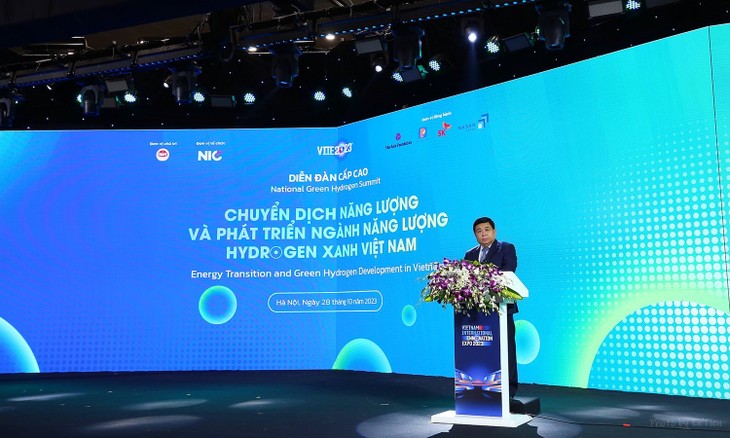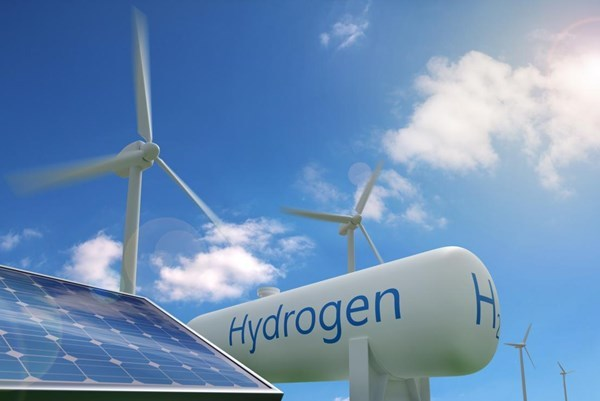(VOVWORLD) - Vietnam is one of 40 countries that have promulgated a strategy for hydrogen energy development. Vietnam added hydrogen energy to its strategic orientation for national energy development until 2030 with a vision to 2045. What does Vietnam need to do to develop a hydrogen energy market to keep up with the global clean energy transition?
 Minister of Planning and Investment Nguyen Chi Dung speaks at the National Summit on Green Hydrogen in Vietnam. (Photo:NIC) Minister of Planning and Investment Nguyen Chi Dung speaks at the National Summit on Green Hydrogen in Vietnam. (Photo:NIC) |
What do foreign experts think of Vietnam’s hydrogen market?
Experts at the National Summit on Green Hydrogen in Vietnam recently held in Hanoi as part of Vietnam International Innovation Expo 2023 agreed that Vietnam has great potential to develop a hydrogen energy market.
 Chey Tae-won, SK group Chairman Chey Tae-won, SK group Chairman |
Chey Tae-won, Chairman of South Korea’s SK group, said, “Vietnam is one of the fastest growing nations but remains highly dependent on fossil fuels. But it can also leverage decarbonization using its potential in different regions. In the South, where renewable energies are plentiful, we can expand renewable energy generation and green hydrogen production. In the North, as the demand for electricity grows we see an opportunity to expand power generation and the production of blue hydrogen using available gas resources. This approach allows us to explore the various hydrogen production methods, tailoring them to each region.”
 Ji Young Lee of SK E&S Ji Young Lee of SK E&S |
According to Ji Young Lee, Head of the Global Hydrogen Business Team, SK E&S, “What will the hydrogen market look like in Vietnam? Central and southern Vietnam are suited to green hydrogen, based on quality solar and wind power resources, while northern Vietnam can produce blue hydrogen using the infrastructure of the LNG hub. Hydrogen will be used in all parts of Vietnam in decarbonizing key industries, power plants, and supporting clean mobility in a balanced manner. A hydrogen market doesn't exist today, and it will take time to come together.”
 Francois Michel, John Cockerill CEO Francois Michel, John Cockerill CEO |
Francois Michel, CEO of John Cockerill, expressed his belief that there will be a number of regional hubs worldwide to produce the apparatus and the equipment to produce green hydrogen.
“For us, of course, one such hub will be the US, for the US market. One is the US. We will have one hub in Europe, one in the Middle East, one in India. And we believe the hub for Asia Pacific will be Vietnam. The fact that we localize the production of the systems in Vietnam will have a direct effect on the competitiveness of producing green hydrogen in Vietnam. The shorter the supply chain, the better it is to produce green hydrogen. And so Vietnam will not only have access to a domestic market of renewable energy, but also to an extremely cheap, let's say, manufacturing footprint, an extremely cost-competitive manufacturing footprint for electrolyzers. This is one of the reasons why we strongly believe in,” said Francois.
 (Photo: nangluongvietnam.vn) (Photo: nangluongvietnam.vn)
|
What does Vietnam need most right now?
Hydrogen is a clean fuel that, when consumed in a fuel cell, produces only water. Hydrogen can be produced from a variety of resources.
It’s obvious that green hydrogen is one feasible and sustainable solution to energy transition, and Vietnam is expected to become the leading country in Asia in green hydrogen development.
But opportunities always come with challenges.
Markus Bissel, Head of the Energy Efficiency Component of GIZ's Energy Support Program, said that the disadvantages are the limited land availability when compared to Australia or Morocco and there's a slightly lower resource quality.
“We conducted studies and compared the costs with other countries. We could see that definitely Vietnam is not the cheapest one. That's mainly because of the shipping costs. But Vietnam, especially in the Asian region, is still competitive,” said Bissel.
What does Vietnam need to do to take advantage of this energy source?
Asheesh Sastry, Managing Director and Senior Partner of Asia-Pacific Energy of the Boston Consulting Group, who has global experience in oil, gas, and renewable energy, said, “We need to have a very strong domestic market first, before we think about exporting, because the first imperative that we need to get right in Vietnam is how do we create that very strong, vibrant domestic market.”
According to Asheesh, there are three angles to this. “One is clearly stimulating demand. Two is creating the right supply environment. And three is making sure that transport costs are minimized as much as possible. And that only happens when you have very strong clusters through which you can enable that demand in the domestic market to take off,” said Asheesh.
Sharing her experience in developing this energy source, Ji Young Lee, Head of the Global Hydrogen Business Team, SK E&S, underscored the important role and support of the Government in getting investors to participate.
“To attract that action, I think there has to be an adequate legal system as well as policies and subsidies just to kickstart it initially. I think as the scale goes up, competitiveness will be secured, and then I think the subsidy can go away,” said Lee, adding, “But initially I think you really need policies and subsidies. You know, in each part of the ecosystem, there has to be government and companies working together to come up with realistic policies. And I think that integration and coordination throughout the value chain is the key factor for success.”
Vietnam has promulgated a national energy master plan until 2030 with a vision to 2050, a national power development plan until 2030 with a vision to 2050, a national strategy on green growth until 2030 with a vision to 2050, and a national action plan on green growth until 2030.
The Hydrogen Energy and Environmental Technology Center was recently established to create a space for business research, cooperation, and development and foster high-quality human resources for innovation toward realizing Vietnam’s commitment to the netzero goal by 2050.